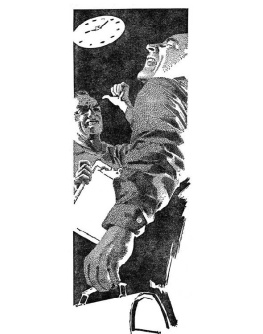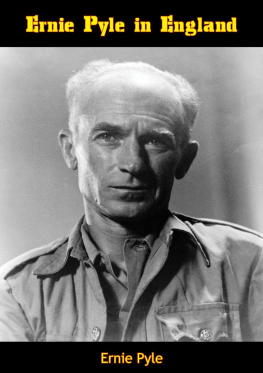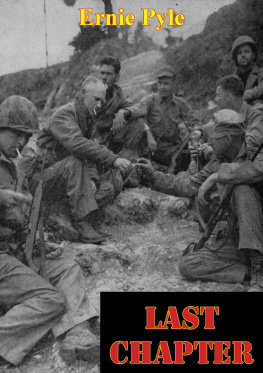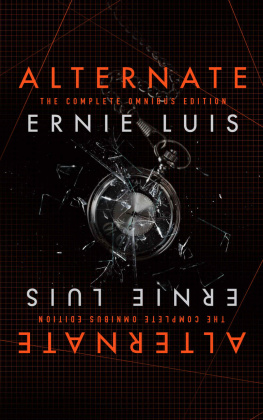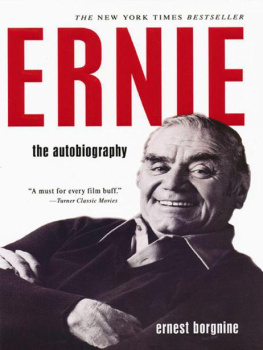All Day Wednesday
Richard Olin
Published: 1963
Type(s): Short Fiction, Science Fiction
Source: http://www.gutenberg.org/etext/30680
Copyright: Please read the legalnotice included in this e-book and/or check the copyright status inyour country.
Note: This book is brought toyou by Feedbooks.
http://www.feedbooks.com
Strictly for personal use, do not use this file for commercialpurposes.
Transcriber's Note:
This etext was produced from Analog Science Fact& Fiction March 1963. Extensive research did not uncover anyevidence that the U.S. copyright on this publication wasrenewed.
E rnie turned thedial on his television. The station he had selected brightened andthe face of the set turned from dark to blue. Ernie sipped his canof beer. He was alone in the room, and it was night.
The picture steadied and Jory looked out of the set at him.Jory's face was tired. He looked bad.
"Hello, Ernie," Jory said.
Ernie turned the dial to the next station.
"Hello, Ernie," the face of Jory said.
At the next spot on the dial: "Hello, Ernie." The next: "Hello,Ernie."
There were five stations that Ernie's set was able to receive.When the fifth station said "Hello, Ernie," and Jory's tired facelooked out at him, Ernie shrugged, took another sip from his can ofbeer and sat down to watch the set.
That happened Wednesday night. Wednesday morning began likethis:
Ernie woke feeling bored. It seemed he was always bored thesedays. An empty can of beer and a crumpled pack of cigarettes restedon top of the dead television. All he did nights was watch TV.
Ernie sighed and thanked God that today was Wednesday. Tonight,when he came home from work, he would be over the hump onlytwo days left and then the week end. Ernie didn't know for surewhat he would do on his week endgo bowling,maybebut whatever he did it was sure to be better than stayinghome every night.
Oh, he supposed he could go out, just once ina while, during the work week. Some of the guys at the plant did.But then, the guys that did go out week nights weren't as sharp attheir jobs as Ernie was. Sometimes they showed up late and pulledother stuff like that. You couldn't do things like that too often,Ernie thought virtuously. Not if it was a good job, a job that youwanted to keep. You had to be sharp.
Ernie smiled. He was sharp. A growing feelingof virtue began to replace his boredom.
Ernie glanced at his watch and went sprawling out of his bed. Hewas late. He didn't even have time for breakfast.
His last thought, as he slammed out of his apartment, was anangry regret that he had not had time to pack a lunch. He wouldhave to eat in the plant cafeteria again. Cafeteria lunches costmoney. Money concerned Ernie. It always did. But right now he wasgoing to need money for the week end; payday was another weekaway.
Ernie punched in twelve minutes late.
His foreman was waiting beside the time clock. He was a big man,and what was left of his red hair matched in color the skin of hisneck. And the color of his face, when he grew angry.
His name was Rogers. He smiled now as Ernie nervously pushed histime card into the clock. His voice was warm and jovial as hespoke.
"Well good morning, Mr. Stump. And did wehave a nice, late, cozy little sleep-in this morning?"
Ernie smiled uncertainly. "I'm sorry, Rogers. I know I'm late,but the time just sort of got away from me"
Rogers laughed lightly. "Think nothing of it,Mr. Stump. These things happen, after all."
"Uh, yeah. Well, like I said, I'm sorry and"
Rogers went on, unheeding. "Of course, complications can developwhen your number three wrist-pin man decides that he just isn'tfeeling sharp this morning and he needs a little extra sleep to puthim right. If you're the foreman for Sub-Assembly Line 3-A, forexample, Mr. Stump, one wonders if the rush order that must befilled by this morning is going to be finished any time before nextChristmas. One wonders where the wrist-pin man is, Mr. Stump. Doeshe intend to come in at all, or will he just snooze his little headoff all day? One wonders what to say to the plant manager, Mr.Stump. How do you tell him that twenty men are standing idle onSub-Assembly Line 3-A because, through a laughable oversight, thereis no one to put in a wrist-pin? How do you explain it so hewillunderstand, Mr. Stump?"
Rogers stopped and caught his breath. His face began growingred. He said slowly, "You don't, Mr. Stump. You don'texplain it so he will understand. I just tried!"
Ernie swallowed. Hurriedly, he said, "Look I'm sorry. I'll getright in there"
Rogers smiled. "That would be nice, Mr. Stump. I imagine thereare quite a few Sub-Assembly 3-A's stacked up in there by now. Youjust trot in there and get them cleaned up."
Ernie nodded doubtfully. "You ain't mad?"
Rogers' smile grew broader. "Mad, Mr. Stump? Why, being chewedout by the manager is a trifle. It's something a foreman mustexpect. It happens to some of them every dayfor a while. And whenit does, it doesn't matter because in just a little while they areno longer foremen. Sometimes, they aren't even workmen, any more.And then they have nothing at all to worry about, so don't let itconcern you, Mr. Stump. Do you take the streetcar to work?"
"Huh? Uh, yeah, I do."
"I thought so." Rogers nodded his head benignly. "Well, just asa suggestion, the next time you see you're going to be late itmight be better if you saved your car-fare and used it to buy anewspaper."
Ernie smiled uncertainly. "O.K. Uh, why?"
"Because," Rogers said slowly, no longer smiling, "the next timeyou leave me in a crack like that, you're going to be reading the'Help Wanted' section! Now get in there and get towork!"
Ernie did.
He worked the rest of the morning in a sullen mood. For onething, with the extra time that Rogers had taken up, Sub-AssemblyLine 3-A was a mess. Incomplete sub-assemblies were stacked on thefloor all around Ernie's spot on the line. He would have to pinthem and slip them into the production line as best he could.
Next to him on the line, Broncewicz said: "Ernie, we'll neverget this job out. Where were you?"
And Ernie told him about the beef with Rogers. He worked as hetalked, but the more he talked the angrier he got. Rogers had beenunfair. He asked Broncewicz, "How can anybody do a good job withthat guy all the time riding 'em?"
Broncewicz nodded. "You should take it to the union."
Ernie snorted. "That's a hot one. Rogers used to be our shopsteward."
"Yeah, I forgot." Broncewicz scratched at a hairy ear. "Anyway,you should tell him off."
"Yeah, I should tell ." Ernie laid aside a wrench to phraseexactly what he wished to say to Rogers, and the next sub-assemblyslipped past. Both he and Broncewicz grabbed it hastily.
Unfortunately, Rogers happened to be watching. He walked over.Broncewicz became intently interested in his work. Ernie sighedresignedly.
Rogers seemed surprisingly resigned, himself. All he said was,"I thought you got enough sleep this morning, Stump. Wake up, geton the stick." He walked off.
Broncewicz raised his head. "Hey, I thought you were going totell him?"
"Aw, shut up."
Ernie did not like his foreman, but neither did he like theprospect of losing his job. He couldn't afford to be out ofwork.

![Olin All day wednesday [eBook - NC Digital Library]](/uploads/posts/book/224659/thumbs/olin-all-day-wednesday-ebook-nc-digital.jpg)
